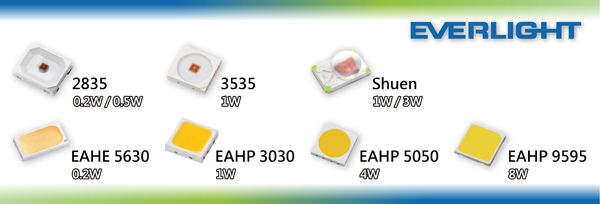LED package prices continued to fall in the second quarter, according to the latest price report from LEDinside, a division of TrendForce. Compared with the prior quarter, the average LED price for lighting application products has fallen by 1~9%, excluding the package 2835 LEDs. Since the 2835 LED products are mainstream products in China’s lighting market, their average price decline has reached 10~17%, more severe than products of other package types. For backlight LED package products, average prices dropped by 3~6% during the second quarter. Price competition in the direct-type LED backlight market remains fiercest this year compared to other LED packages market.
Roger Chu, Research Director at LEDinside, stated second quarter in past years was usually the peak season for the LED market, but this year’s demand growth has been considerably weaker. The main factor behind this is the volatile global economy, which in turn causes big exchange rate fluctuations in several regions. Currency depreciations in Europe, Japan, and the emerging markets have made imports of LED bulb and other electronic products more costly for consumers. Consequently, demands are scaled back and LED manufacturers are now undercutting each other in order to maintain their capacity utilization rates. The price lowering has also meant that manufacturers are shifting their strategies and focusing on niche markets, which covers automotive LED, UV, IR, flip-chip, CSP, and other highly profitable LED products. Aggressive expansion into the niche market will help boost the manufacturers’ margins.
 |
|
Everlight LED chips. On the far left is a 2835 LED. (Photo Courtesy of Everlight) |
The quarterly price drop-off for products of the 0.5W 2835 LED have reached 17% because they are currently the main offerings of many Chinese LED manufacturers. Consequently, the price competition among 2835 products is quite intense. Both the 1W 3030 LED products and the 1-5W high power LED (ceramic substrate) products have seen an average price decline of 9% in the second quarter. By contrast, price changes for the rest of the LED products have been relatively small. “Although the market gradually recovered after the Chinese New Year holidays,” said Chu, “the demands were not as robust as during the same period of last year, so LED manufacturers had to slash prices.”
For the LED backlight market, its growth this year has been slower than the previous because the end market demand picked up much later and changes were made to China’s LED subsidy policy. LEDs for the direct-type TV application have experienced the greatest quote price decline in the second quarter, with packages 3030, 2835, 3535 and 3228 fallen to US$0.25~0.3/pc. The LED package price for mid-range and low-end TVs dropped by nearly 6% quarterly. The 7020 LED package, which is the mainstream for the edge-type TV application, are priced around US$0.085~0.095/pc. The end market prices for edge-type TVs are higher due to the applications of advanced technologies and design concepts like high resolution, high color saturation, curved screen, and thin body. LED package price for the edge-type TV application in turn experienced lesser downward price pressure.
Read more at http://press.trendforce.com/press/20150512-1913.html#t1vEUFwBL22tpArX.99












